Public schools grappling with Confederate names, images
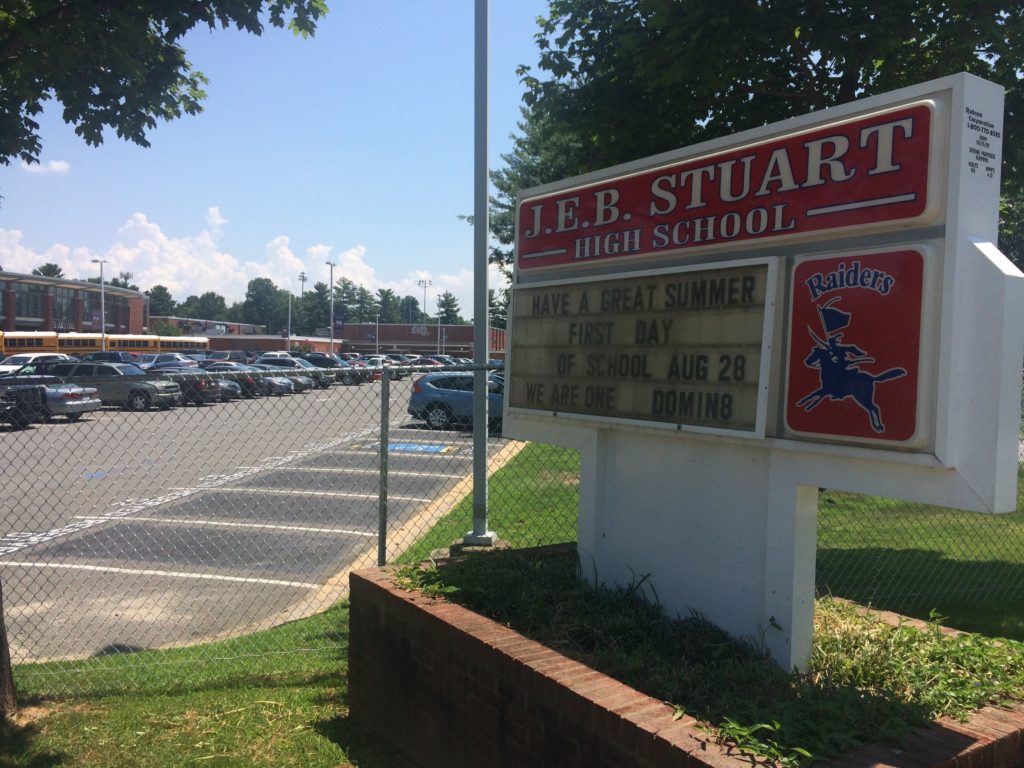
With a new school year dawning, education officials are grappling with whether to remove the names, images and statues of Confederate figures from public schools – especially since some are now filled with students of color. The violence at a white nationalist rally over a Robert E. Lee statue in Charlottesville, Virginia, is giving school officials a new reason to reconsider whether it’s appropriate for more than 100 schools to be named after Confederate generals and politicians from the Old South. “It does not make sense to have schools named after individuals who were directly connected to that dark past, and force kids in Dallas, a majority minority population, to walk into these schools every day and have to face this past every single day,” said Miguel Solis, former board president and current board member of the Dallas Independent School District. Dallas, along with other cities, began moving to change Confederate names and imagery after white nationalist and Confederate enthusiast Dylann Roof murdered nine black churchgoers in Charleston, South Carolina on June 17, 2015. But the review gained momentum after the Aug. 12 protest by white supremacists in Charlottesville, which left one counter-protester dead. “We don’t tolerate hate or discrimination of any form, and we are committed to providing an educational environment where all students can feel safe and welcomed at school,” said Superintendent Aurora Lora in Oklahoma City as she announced plans earlier this month to discuss name changes. Her city has four schools named after Confederate generals, including an elementary school named after Native American Confederate Gen. Stand Watie, who led the Cherokee Regiment of Mounted Rifles. He was the only Native American to achieve the rank of general in the Civil War and was the last Confederate general to surrender, giving up on June 23, 1865. “We want to think about the people our buildings are named after and whether they represent the values we as a district have at this time,” Lora said. According to the Southern Poverty Law Center, there are at least 109 public schools named after Robert E. Lee, Jefferson Davis or other Confederate icons in the United States. Of those, “27 have student populations that are majority African-American, and 10 have African-American populations of over 90 percent,” according to the SPLC’s 2016 report. Several school names were changed, or new schools were built and named after Confederates “during the era of white resistance to equality,” the SPLC report said. Solis said that the Confederate names in Dallas came about because of the local Ku Klux Klan. He said his effort to change school names has had “overwhelming support. That’s not to say that there haven’t been people who have been very upset because they believe either the history needs to be preserved, or they align the philosophy of the Confederacy or neo-Nazis, but for the most part I’ve gotten support.” This all comes as a wave of anti-Confederate imagery rolls across the country. Confederate statues are being taken down on college campuses and in cities around the nation, and others are being vandalized or covered. For example, the University of Texas at Austin removed four Confederate statues and Duke University removed a damaged Confederate Gen. Robert E. Lee statue earlier this month. In Charlottesville, workers draped giant black covers over the towering monument of Gen. Robert E. Lee on horseback and later a statue of Gen. Thomas “Stonewall” Jackson. The South has the majority of Confederate-named public schools in the country. In Falls Church, Virginia, the school board has voted to rename J.E.B. Stuart High School. Stuart was a slaveholding Confederate general who was mortally wounded in an 1864 battle. In Montgomery, Alabama, the school board is looking at moving Lee’s statue from the front of majority-black Robert E. Lee High School. In Arlington, Virginia, Robert E. Lee’s hometown, there is a move now to rename Washington-Lee High School. “It is time to talk about the values these names reflect and the messages we are sending to our children,” Barbara Kanninen, Arlington school board chair, said in a statement. At some schools, the push for change starts with the students. In Greenville, South Carolina, student Asha Marie started a Change.org petition to rename Wade Hampton High School. Hampton was a Confederate cavalry commander during the Civil War and was later elected governor of South Carolina and criticized the Reconstruction era which put black leaders in political office. “Racism, bigotry, and a blatant lack of patriotism,” she wrote in her petition. “These are not values of South Carolinians and should not continue to be enshrined in a place of learning.” But another student, Austin Ritter, started a counterpetition to keep the name. “There is no need to change the school’s name,” Ritter wrote. “Changing the name of this school will also change its history. It will change everything the school has stood for. Everything the school has done.” At others, alumni and outsiders are the ones sounding the call. The debate over the Stuart name change in Falls Church kicked off in earnest in 2015 when actress Julianne Moore, who attended Stuart in the ’70s, and Hollywood producer Bruce Cohen, a Stuart alumnus, launched a petition demanding the name change. In Alabama, it was a community activist who suggested moving the Lee statue out from in front of Robert E. Lee High School. Changing a school’s name is not cheap. In Oklahoma City, Lora said it could be $50,000 or more to change signage, letterhead, business cards and more for each school; Other school officials have quoted higher and lower figures. “You can make any excuse you want to try and stop something like this and dollars are what a lot of people lead with,” said Solis, who called it a “hollow argument.” Instead, people should get creative, he said, for example, in Texas possibly renaming schools currently named after Robert E. Lee after golfer Lee Trevino, allowing them to keep the “Lee” identity. In Arlington, there has been some talk among
Black lawmakers in Mississippi to protest over Confederate emblem on flag
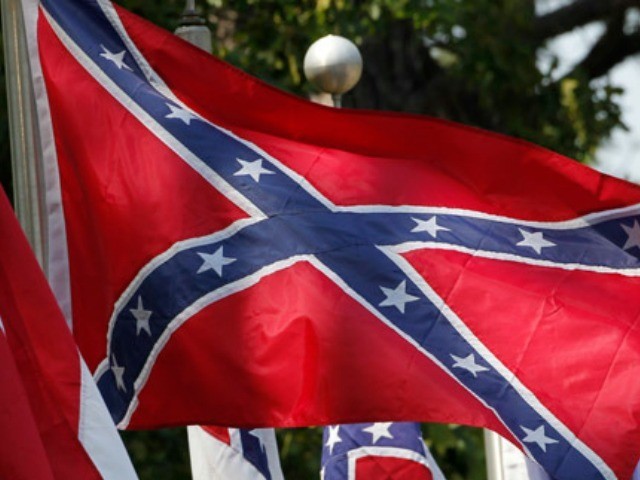
In part of a sweeping debate about the public display of Confederate symbols across the South, some black legislators in Mississippi say they are boycotting a regional meeting that their own state is hosting this summer, to protest the rebel emblem on the state flag. The Mississippi Legislative Black Caucus is asking the Southern Legislative Conference to push Mississippi to lose its status as the last state with a flag featuring the Confederate battle emblem — a red field topped by a blue tilted cross dotted by 13 white stars. All eight of Mississippi’s public universities and several counties and cities, including Biloxi, have stopped flying the flag because of the Confederate emblem. Most have done it since the June 2015 slayings of nine black worshippers at a church in Charleston, South Carolina. The man later convicted in the killings was an avowed white supremacist who had posed for photos holding the Confederate battle flag. South Carolina removed a Confederate battle flag from the statehouse lawn soon after the slayings. New Orleans recently started taking down Confederate statues. The Mississippi Legislative Black Caucus chairwoman, Democratic Rep. Sonya Williams-Barnes of Gulfport, said Tuesday that the boycott is designed to put pressure on state House Speaker Philip Gunn. Soon after the Charleston shootings, Republican Gunn, who is white, said his Christian faith led him to see the Confederate symbol as “a point of offense that needs to be removed” from the Mississippi flag. But, he has not rounded up the votes to make a change. Gunn is chairman of the Southern Legislative Conference, with members from 15 states. The group holds its annual meeting July 29-Aug. 2 in Biloxi. Gunn said in a statement Tuesday that SLC “is a well-respected organization” and the meeting will “showcase the positives of Mississippi.” “It brings a great amount of economic benefit to the state, attracting nearly 1,000 people,” Gunn said. “This event is a good opportunity to stand with me, someone who has not wavered in my support of changing the flag, to promote all that is good about our great state.” Critics say the Confederate symbol is a divisive reminder of slavery and segregation in a state with a 38 percent black population, but supporters say it represents history that should not be forgotten. Mississippi has used the same flag since 1894, and voters chose to keep it in a 2001 election. Williams-Barnes told The Associated Press that the Black Caucus has not united around a new design proposal. “What we’re really wanting is a flag that charts a different future for our state, that charts a different future for our children and that is about a vision that unites people in the state with each other as well as unites Mississippi with other states in the nation,” she said. The executive director of the Council of State Governments’ Southern Legislative Conference, based in Atlanta, was traveling and did not immediately return a message. During the legislative session that ended in March, several bills proposed redesigning the flag and some others proposed financial punishment for universities that have stopped flying it. All died because Gunn and other leaders said there was no consensus among lawmakers to either reject or protect the flag. Fifty-one of Mississippi’s 174 state lawmakers are black, and 50 of them are in the Black Caucus. Williams-Barnes said a majority of caucus members voted to boycott the regional conference, and about 80 percent are planning to take part in the boycott. She said she will ask black legislators from other states to stay away, as well. Republished with permission of The Associated Press.
Southern Baptists: Discontinue display of Confederate flag

The Southern Baptist Convention on Tuesday urged Christians to stop displaying the Confederate battle flag, recognizing that it is perceived by many as a “symbol of hatred, bigotry and racism” that offends millions of people. The resolution, originally presented by African-American Pastor Dwight McKissic, had stirred debate and led to at least one call to withdraw it. The version presented to thousands of delegates to the denomination’s annual meeting in St. Louis was less strongly worded. Despite some opposition on Tuesday from delegates who thought even the more conciliatory version was divisive and political, delegates voted by a wide margin to strengthen the language. They removed a sentence saying that the flag serves for some as a memorial to loved ones who died in the Civil War and not as a racist symbol. They also changed the call for Christians to “consider prayerfully whether to limit, or even more so, discontinue” the flag’s display. The final version approved by delegates simply asks Christians to discontinue its use. The vote followed an earlier address by convention President Ronnie Floyd, a white pastor who has made racial unity a priority of his presidency. He told the audience in St. Louis, “I believe the issue of racism is from Satan and his demonic forces of hell. It is an assault on the Gospel of Jesus Christ.” The nation’s largest Protestant denomination was founded in a split with northern Baptists over slavery, has a history of complicity with Jim Crow laws and is still 80-90 percent white. But with 15.3 million members, that translates to at least 1.5 million non-white members in the Nashville-based denomination. And while membership at white churches is decreasing, membership at churches that Southern Baptists identify as predominantly “non-Anglo” is on the rise. That emergent diversity was on display as Floyd convened a group of pastors who were African-American, Hispanic, Asian, Native American and white to discuss racial unity along with Jerry Young, the president of the largest historically black denomination, the National Baptist Convention U.S.A. Southern Baptists also passed a resolution condemning the recent shooting in Orlando. Southern Baptists consider same-sex marriage and sexual relations to be sinful, but the resolution says “we regard those affected by this tragedy as fellow image-bearers of God and our neighbors.” At the same time, the thousands of delegates to the meeting also adopted a resolution seeking protection for the religious liberties of those who oppose gay marriage and transgender bathroom access. “We stand in solidarity with those whose jobs, professions, businesses, ministries, schools, and personal freedoms are threatened because their consciences will not allow them to recognize, promote, or participate in activities associated with unbiblical marriage,” the resolution states. Delegates also approved a resolution of support for Israel that criticized the boycott, divestment and sanctions movement. Resolutions on drafting women into the military and affirming “In God We Trust” as the national motto were postponed until Wednesday. All Southern Baptist churches are independent and the resolutions are not binding on them, but resolutions are an expression of the opinions and concerns of the delegates who represent those churches. Republished with permission of The Associated Press.
Man arrested for punching anti-Donald Trump protester is an Air Force member

A man captured on video kicking and punching an anti-Donald Trump protester at the presidential candidate’s rally in Tucson on Saturday is a member of the Air Force. Staff Sgt. Tony Pettway, a response force leader, is assigned to the Davis-Monthan Air Force Base in Tucson and was arrested on Saturday on a misdemeanor charge of assault with injury. He works in security forces. The event in Tucson turned ugly when two protesters displayed offensive imagery in an attempt to make a statement against the divisiveness of the Trump campaign. Pettway was one of several people arrested at two Trump rallies in Arizona this weekend. The anti-Trump protester carried a sign with a Confederate flag over an image of Trump and was being escorted out of the building when Pettway punched and kicked him. The incident was caught on video. People can be heard cheering as Trump denounces another protester who was wearing a KKK-style sheet. “There’s a disgusting guy. Puts a Ku Klux Klan hat on. Thinks he’s cute. He’s a disgusting guy,” Trump said. “I’m going to tell you folks, that’s a disgrace. They are taking away our First Amendment rights.” Davis-Monthan is reviewing the situation and will take appropriate action, said 2nd Lt. Sydney Smith of the 355th Fighter Wing public affairs office. Airmen are allowed to participate in political events on their own time, Smith said. “We believe wholeheartedly in our fellow Americans’ rights to express their views on political issues, and we strongly condemn any attempt to silence those views through force or violence,” Smith said. Pettway was released without being booked into jail. It is unclear if he has an attorney. Pettway, 32, began active duty in the Air Force in August 2002 and completed his basic training at Lackland Air Force Base in Texas, Air Force Personnel Center spokesman Mike Dickerson said. He was stationed in South Korea twice and in New Mexico before moving to Davis-Monthan in December 2012. Dickerson said Pettway has received a commendation medal on three occasions but didn’t know what they were for. Tucson police also arrested 67-year-old Linda Rothman on a misdemeanor count of assault without injury. They haven’t said why she was arrested. Authorities in Phoenix, where Trump held a rally earlier in the day, also arrested several protesters. Maricopa County Sheriff’s deputies identified three protesters who were arrested while helping block the only major highway leading to a Trump rally in metropolitan Phoenix. Steffany Laughlin, Jacinta Gonzalez and Michael Cassidy were all booked on one count of obstructing a public thoroughfare, deputies said. Republished with permission of the Associated Press.
Committee gives favorable report to Heritage Preservation Act
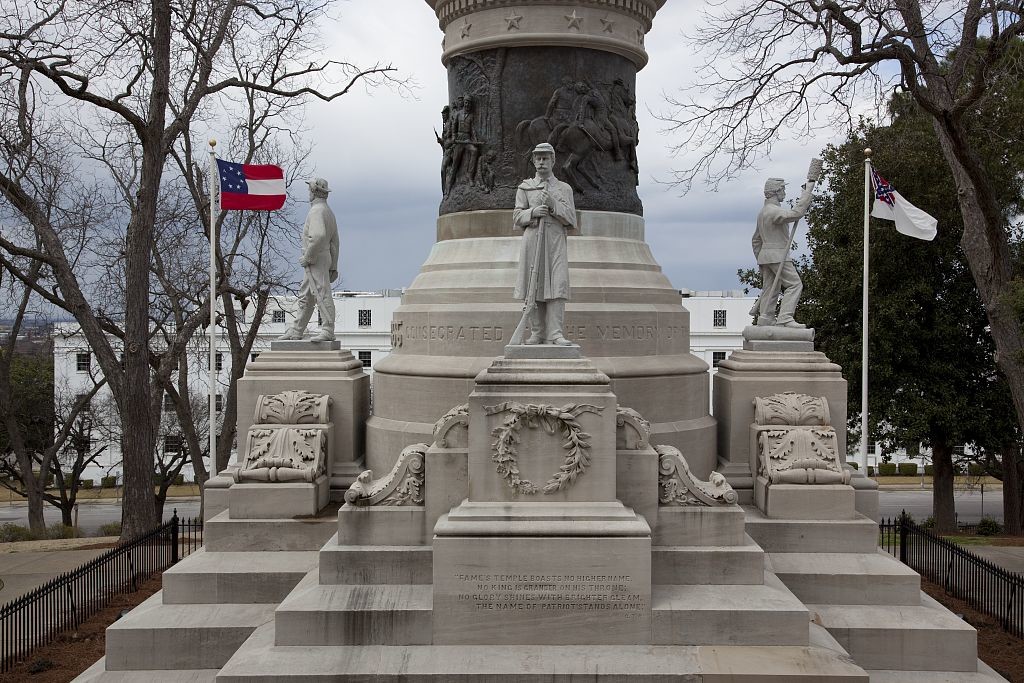
In a 5-2 vote down party lines, the Senate Governmental Affairs Committee gave a favorable report to SB 13, a bill from Sen. Gerald Allen (R-Tuscaloosa) that would prohibit the removal of historical monuments placed on public property. The bill would also create a committee tasked with reviewing the requests of municipalities interested in removing protected monuments. Sen. Linda Coleman-Madison (D-Birmingham) voiced opposition to the bill on the grounds that, perhaps, the state should direct its edict only to state monuments, allowing local governments to act in the interest of their cities. Further, she noted the need to provide funding to municipalities to maintain such monuments. “I understand where you’re going with this bill and your intent,” Coleman-Madison said. “I agree with your intent. I don’t think we need to be about changing history or trying to cover it up. I’m not for taking those Confederate statues down, but I’m not for your bill because I do not believe this legislative body has more wisdom than the people who put [the monuments] there.” Sen. Dick Brewbaker (R-Montgomery) noted his agreement with most of Coleman-Madison’s comments, but added that the need for this bill has arisen out of the public’s disdain for the decision by Gov. Robert Bentley to remove the Confederate flag this year. Brewbaker said that disdain is currently manifesting itself in efforts to place a Confederate flag on a small lot near Alabama State University in Montgomery. “We’re dealing with an issue in Montgomery right now that’s not going to do anybody any good,” Brewbaker said. In response, Coleman-Madison again noted the need to provide funding for the monuments. “If we do this, the state best come up with some money to maintain them,” Coleman-Madison said. “I do think the backlash you’re going to have (will be) some vandalism of some things.” The committee then voted and gave the bill a favorable report, sending it before the Senate in the coming week.
Speaker Mike Hubbard appoints former pol who removed Confederate flags to state board

While one could get rich off asking the question “What was he thinking?” about Speaker Mike Hubbard, I have to question why, in the midst of his own criminal trial, Speaker Hubbard would attract unnecessary negative attention to himself by making what can only be considered a questionable appointment. As Alabama Today previously reported, in May former lawmaker Myron Penn decided that it was his right, responsibility even, to walk into a public cemetery and remove small confederate flags that had been planted on the graves of confederate soldiers because he personally deemed them offensive. The story received national attention and though defenders of the confederate flag noted that it is against the law to remove things from gravesides ultimately no charges were filed. Now reasonable people would probably think this is where Penn’s story would end however in a social media post last week State Auditor Jim Ziegler announced that he had been tipped off to Penn’s appointment to the State Personnel Board. Ziegler initially wrote a scathing social media report believing Governor Robert Bentley made the appointment. He later removed his original post when the Governor’s office denied the appointment. Alabama Today was able to confirm that Speaker Mike Hubbard had indeed appointed Penn. As to why he got the appointment Speaker Hubbard’s office said, “Mr. Penn was selected to serve on the State Personnel Board based on his career experience and legislative service, which provided the needed familiarity with state employee issues.” When asked about the flag incident the speakers office replied, “To my knowledge, the State Personnel Board does not make decisions on where the confederate flag is flown so that was not part of the consideration for this position.” Fair point if not for the question about Penn’s judgement. By removing the flags based on his personal beliefs does Penn believe he’s above the law or rules and that his personal beliefs trump that of others? When there were other alternatives available, such as calling the city to report or question the flags, why did Penn feel like instead he should walk into a cemetery and remove items for the graveyards of soldiers? In the bigger picture I believe this is a matter of judgement and today I’m questioning not just Penn’s but also Speaker Hubbard’s.
Weekend Confederate flag, secession rally set for Alabama Capitol
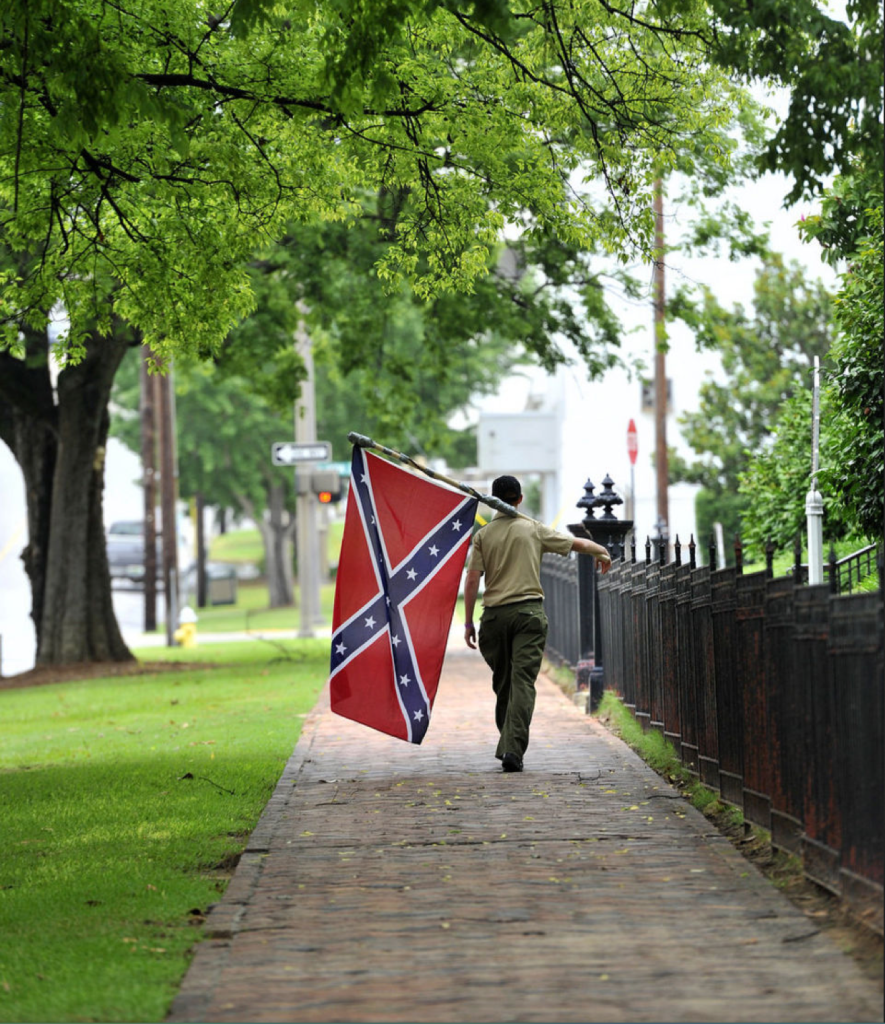
Saturday, a “Secession Rally” planned by the Alabama Flaggers, a pro-Confederate battle flag group, is set to take place at the Alabama State Capitol. “We are rallying for the secession from the United States of America brings (sic) your flags bring your secession flags bring your secession signs,” states the event sponsor, Alabama Flaggers’ Facebook page. The event is scheduled in response to Gov. Robert Bentley removal the Confederate flags from a memorial on the grounds of the state Capitol after the mass shooting at Emanuel African Methodist Episcopal Church, a black church in Charleston S.C., in June. “What we do is we fight to preserve our heritage, our monuments, our cemeteries and anything having to do with our heritage that is being destroyed,” Alabama Flaggers co-director Freda Mincey-Burton told AL.com. “We are trying to get the point across that we are tired of being walked on. We are tired of having our monuments defaced and destroyed. We do have constitutional rights.” Despite being banned from many Confederate flag rallies in the past months for their extreme views, the Southern Poverty Law Center has learned that the Alabama Flaggers extended an invitation to the hate-group the League of the South, and that several members of the League are scheduled to speak at the secession rally. “The LOS has become increasingly radical in recent years, and even more notably in recent months, as they have eagerly taken on a mantle of victimhood as the Confederate flag has come under fire and begun preparing themselves for an inevitable race war,” says the SPLC Hatewatch staff. As of Thursday, more than 300 people have indicated that they will attend Saturday’s 11 a.m. – 4 p.m. event.
Some Americans refuse to give up on Confederate flag
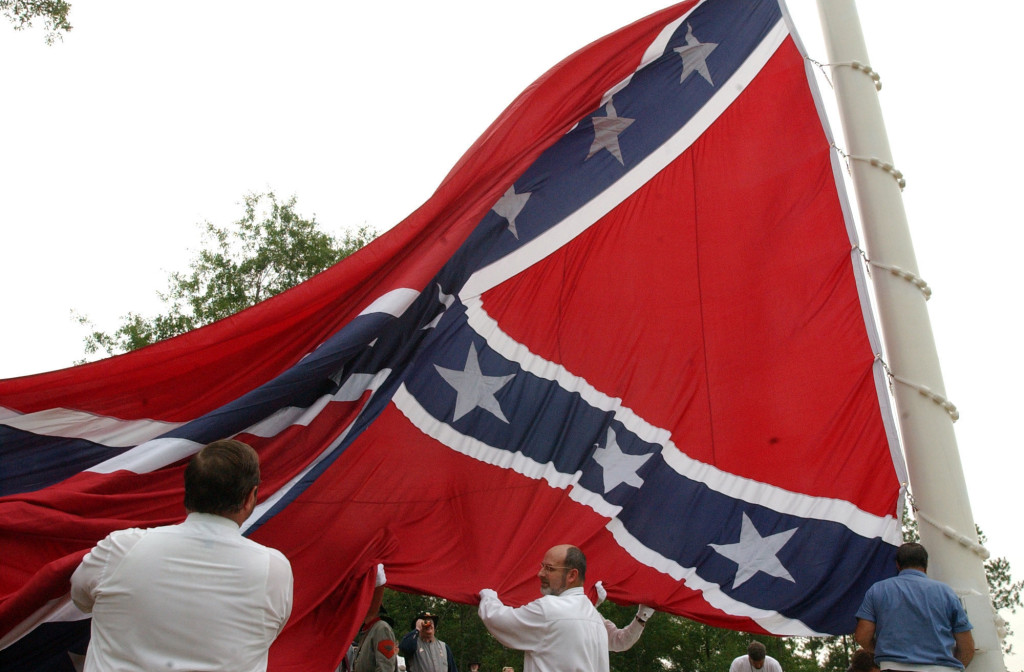
Many Americans assumed the Confederate flag was retired for good after governors in South Carolina and Alabama removed it from their statehouses this summer and presidential candidates from both parties declared it too divisive for official display. But people still fly it, and not just in the South, despite announcements by leading flag-makers and retailers that they will no longer sell products showing the secessionist battle flag. Some who display it are motivated by pride in their ancestry or enthusiasm for Southern history. Others see it as a symbol of their right to challenge to authority in general, and the federal government in particular. And some have hoisted Confederate flags in recent weeks precisely because it’s generating controversy again. “You can’t take it out on the flag — the flag had nothing to do with it,” said Ralph Chronister, who felt inspired to dig out his old Confederate flag, which is decorated with a bald eagle, and hang it from his weather-beaten front porch on a heavily traveled street in Hanover, Pennsylvania. “I’ve got nothing against black people; I’ve got nothing against anyone else,” said Chronister, 46, who was raised in Maryland. “I’m just very proud of my Southern heritage. That’s why I fly it.” An uncomfortable tolerance of the Confederate flag in mainstream society was upended in June when photos circulated on the Internet revealing that a young white racist charged with killing nine black churchgoers in Charleston, South Carolina, had posed with the Confederate symbol. Dylann Roof also burned a U.S. flag for good measure. Roof wants to plead guilty to more than 30 federal charges, his lawyer said Friday. John Russell Houser — the right-wing extremist who shot 11 people, two of them fatally, before killing himself in a Louisiana movie theater in July — also flew a large Confederate flag outside his home, and hung a Nazi swastika banner outside a bar he owned in Georgia. Many politicians echoed South Carolina’s Republican Gov. Nikki Haley to remove the Confederate flag after the Charleston killings, describing it as a relic that belongs in museums but not on official display. Haley called it “a deeply offensive symbol of a brutally oppressive past.” Democratic presidential candidate Hillary Clinton said “it shouldn’t fly anywhere.” Hundreds of Confederate flag wavers gathered this weekend in Georgia’s Stone Mountain Park, home to the huge “Confederate Memorial Carving” featuring Confederate President Jefferson Davis, General Robert E. Lee and General Thomas “Stonewall” Jackson. But the flags aren’t hard to find in places like Hanover, a factory and farm community about six miles north of the Mason-Dixon Line that saw action during the Civil War’s Gettysburg campaign. One flies from a pole on the main road into town, by a National Rifle Association banner. Another was hung from a second-floor apartment, directly above a day-care downstairs. Jeremy Gouge, a 44-year-old roofer, says family ties to the South are why he proudly flies a Confederate battle flag on a pole in his front yard, on a quiet residential street not far from Chronister’s home. “I know there’s things that happened to slaves and things. I can’t control what other people have done,” Gouge said. “What’s the next flag that someone is going to say, ‘We don’t like that flag, let’s take that one down?’” It’s hardly the only place where Confederate flags fly in northern states. Hannah Alberstadt said she was surprised to see many of them in her hometown of Girard in northwestern Pennsylvania. “My town has always had sort of a hickish contingent, but it’s like every other day I see another Confederate flag, and it’s just shocking,” she said. “These people are definitely trying to make a statement, because people have them waving from their truck beds, people have them on a stick in their front yards, people are wearing them to the grocery store.” The symbol still raises ire: A flag on the back of a pickup truck parked in a convenience store lot in the middle of Hanover was set on fire. And in Elk Grove, California, a Confederate flag was displayed at a gun shop until the owners removed it in late June after getting death threats. In Las Vegas, Republican state assembly woman Michelle Fiore sent out a campaign email comparing South Carolina’s removal of the flag to avoiding discussion of concentration camps and genocide. People can’t “pick and choose what parts of our history you want to remember,” Fiore said. In eastern Michigan, flag supporters staged a rolling rally, with more than 50 vehicles participating. And in Florida, an estimated 2,000 vehicles adorned with the Confederate battle flag rallied outside a government complex in Ocala, with many demonstrators sporting shirts with phrases like “heritage not hate.” On Thursday, surveillance cameras recorded two white men leaving Confederate battle flags on the grounds of the Ebenezer Baptist Church in Atlanta, where Martin Luther King Jr. began his campaign for racial justice a half-century ago. The Rev. Raphael Warnock called it a “hateful act” and an “effort to intimidate us in some way.” The condemnations have been good for the business of Robert Hayes, who runs the Southern Patriot Shop in Abbeville, South Carolina. A sign outside his shop warned customers he’d sold out of Confederate flags and may be out for a month or more. Hayes figures he sold about 400 after the Charleston shooting, instead of the two dozen or so he typically sells. And the purchasers seem different to him now. Teens are buying it as a rebellious counter-culture statement against political correctness, Hayes said, and others talk of taking a stand against big government and holding fast to what they hold dear. Carson Kimsey, 23, came to Hayes’ shop hoping for a flag to fly outside his Elbert County, Georgia, home. Kimsey gave a few different answers about the Confederate flag license plate on his pickup truck, then looked down for a second when asked if he ever thinks about how blacks feel when they see it.
Flags lowered across nation to honor servicemen, not in Alabama
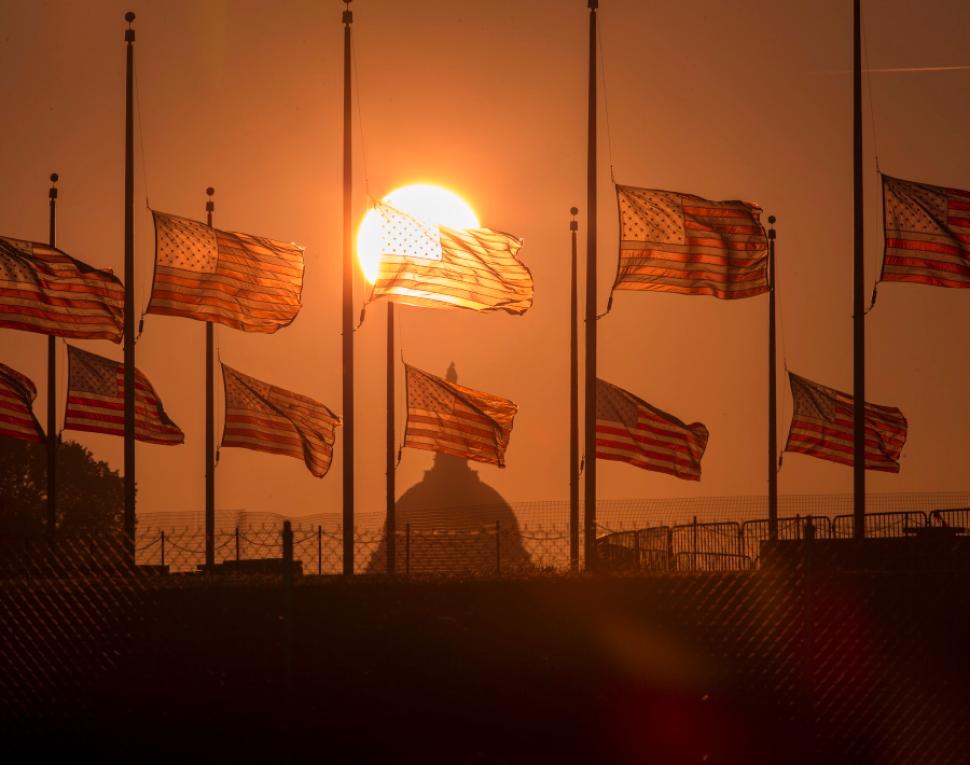
Flags have been lowered to fly at half-staff at the U.S. Capitol, in Florida and in other states to honor the victims of the terrorist attack at two military centers in Chattanooga last Thursday. Four marines and a sailor lost their lives, prompting calls to arm the military and national guard at their offices. State Auditor Jim Zeigler has called upon the Gov. Robert Bentley to lower the flags in Alabama as well. He posted a Facebook status which read: Flags in Alabama not lowered to half staff in honor of slain military personnel in Chattanooga I have now requested that Gov. Robert Bentley lower our flags to half staff in honor of our military personnel murdered in Chattanooga. This step of honor has not been taken at this time. The protocol is that the President requests the Governor who directs the Director of Capitol Operations to lower the flags. Since this has not been done, I have requested both the Governor and the Director of Capitol operations to now lower our flags. New protocol for an old tradition. I do not agree that Alabama should be bound by the President’s lack of action in this regard. We are a sovereign state and own and control these flags. According to AL.Com Thomasville Mayor Sheldon Day has also requested the flags be lowered. Mayor day quoted in their story as saying, “I respectfully request Governor Robert Bentley to issue an executive order asking everyone in our state to lower their flags to half staff in tribute to the five fallen heroes who were killed this week while doing their duty and serving America.” Alabama Today has asked the governor’s office for comment and will update this story when more information becomes available.
Organizers of confederate rally blame city officials for supporter’s death
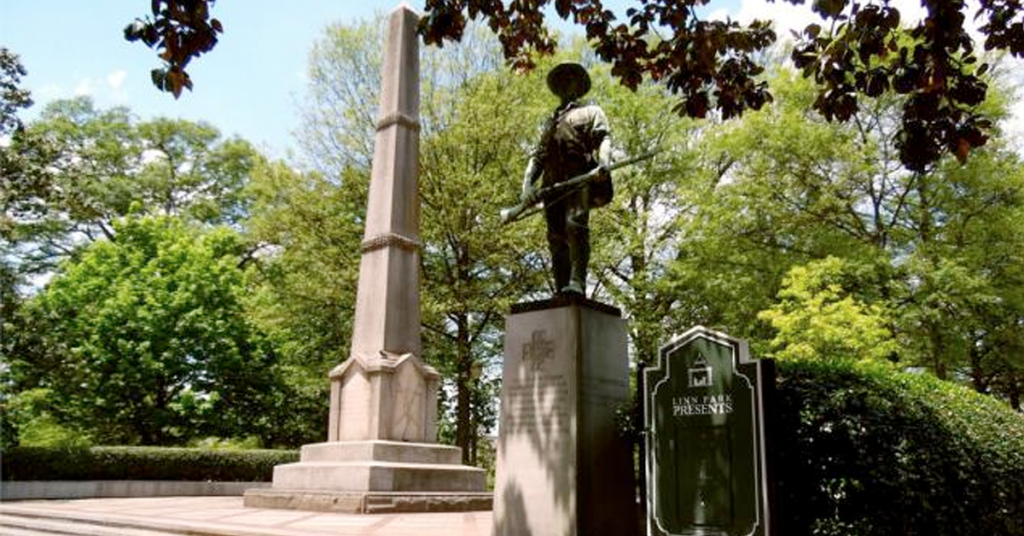
A crowd of hundreds gathered at an event sponsored by Save Our South in Birmingham on Saturday to protest the decision of the Birmingham Parks and Recreation board to remove a confederate memorial in a public park. Following the event two of the guest speakers were involved in a car crash. A message posted on the Save Our South Facebook page read in part, “Our guest speakers at the Birmingham Rally were allegedly followed and forced off the road in Mississippi. Arlene Baarnum sustained injuries but she is in stable condition. Veteran and activist Anthony Hervey did not survive the tragic incident. Please send prayers to both of their families right now.” In a statement given to the Examiner Ginger Barbee, a lawyer for a group that sponsored the event, blamed local authorities for the tragedy. “I want the Birmingham Parks and Recreations board to know that they are ultimately responsible for this tragedy,” she said, according to a statement Barbee gave Examiner late Sunday. “If they had not voted to remove the monument, this young, heroic black man would still be alive. They have caused so much racial division in a great city which has had very few racial issues since the Civil Rights movement. Anthony Hervey gave his life for something he believed in, reaching across racial lines to preserve history and protect our Constitutional rights. He was a Veteran and a Purple Heart recipient. Our prayers go out to his family during this time. He will be remembered.” The video of the surviver of the crash Arlene Barnum speaking at the event has is below.. BURN BABY BURN!! Arlene Barnum tells her part time employer, the NAACP, to “take this job and shove it!” Then she lights her NAACP membership card on fire! She says, “They are the real racists!” – Join us! We are truly multicultural! Let’s work together to Save Our South and our great America! #SaveOurSouth Posted by Save Our South on Saturday, July 18, 2015
Sen. Gerald Allen files bill to prevent removing historic landmarks

An Alabama state senator wants to pass legislation prohibiting the removal of historic monuments, markers and school names after debate over the display of Confederate emblems on public property. Republican state Sen. Gerald Allen said Thursday that the legislation would protect all history in the state. Allen filed the bill in the Special Legislative Session that began Monday. However, Allen must get the support of two thirds of state lawmakers since the bill is outside Gov. Robert Bentley‘s call for the Special Session. Allen said the bill is not meant as a reaction to the governor’s decision to remove four Confederate flags from a monument next to the Capitol. Bentley says he has no plans to remove any other Confederate monuments on Capitol grounds. Republished with permission of The Associated Press.
Alabama lawyer sues Robert Bentley over Confederate flag removal
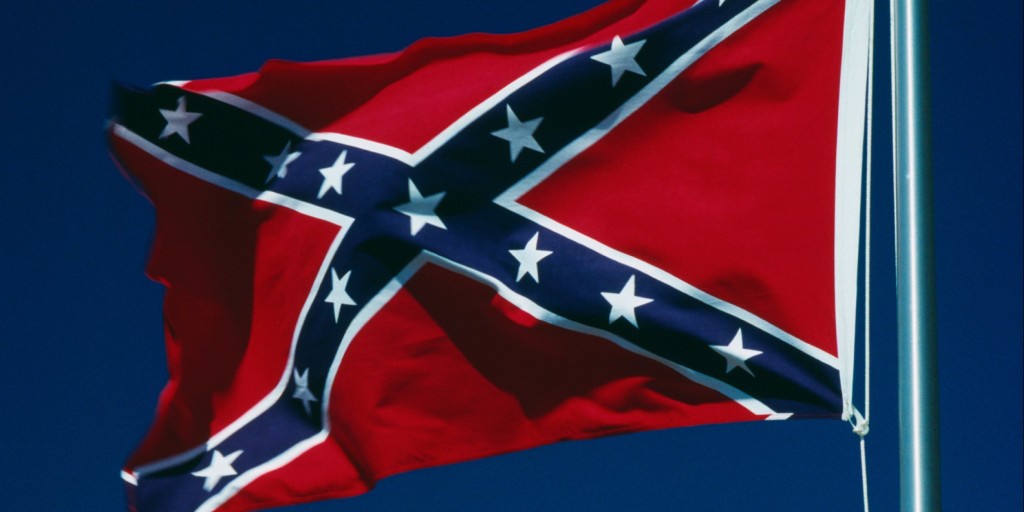
A Cullman lawyer has sued Alabama Gov. Robert Bentley over his decision to remove four Confederate flags from a Confederate monument next to the state Capitol. Melvin Hasting, who filed the suit Tuesday in Montgomery Circuit Court, said he is asking a judge to declare whether Bentley had the legal authority to remove the flags. Hasting said he wonders whether Bentley overstepped his bounds last month by ordering the flags to be removed. A national debate about the Confederate flag began last month after the June 17 fatal shooting of nine black worshipers at a church in Charleston, S.C. Bentley received praise, and some criticism, for quickly removing the flags from the 88-foot-tall monument. “None of this is just about the flag,” Hasting said in an interview Wednesday. “It’s about our history, our heritage and protecting it in the state of Alabama.” A spokeswoman for Bentley did not respond to a request for comment. Bentley has previously said he checked with his staff to confirm his legal authority before removing the flags. Hasting is also suing the Alabama Historical Commission for removing Confederate battle flag items from the state Capitol gift store. Last week, Alabama Historical Commission acting Executive Director Lisa Jones said the commission decided to remove a small number of items from the Goat Hill Museum Store. The store on the first floor of the Capitol removed the items after the flags outside were taken down. The items were then transferred to Confederate Memorial Park, which is also managed by the commission. Jones did not respond to a request for comment regarding the lawsuit. Hasting, who said he campaigned for Bentley during the governor’s first gubernatorial campaign, said it’s “nothing personal.” “He is a good man,” Hasting said. “He means well, but we’ve got to stop what’s going on.” Republished with permission of The Associated Press.


